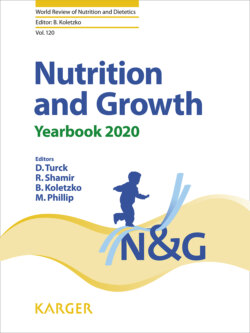Читать книгу Nutrition and Growth - Группа авторов - Страница 38
На сайте Литреса книга снята с продажи.
Early rapid weight gain among formula-fed infants: Impact of formula type and maternal feeding styles
ОглавлениеMennella JA1, Papas MA2, Reiter AR1, Stallings VA3, Trabulsi JC4
1Monell Chemical Senses Center, Philadelphia, PA, USA; 2Christiana Care Health System Value Institute, Newark, DE, USA; 3Division of Gastroenterology, Hepatology and Nutrition, Children’s Hospital of Philadelphia, Philadelphia, PA, USA; 4Department of Behavioral Health and Nutrition, University of Delaware College of Health and Sciences, Newark, DE, USA
Pediatr Obes 2019;14:12503
Background: What and how infants are fed are considered important determinants for the risk factor of early rapid gain weight.
Objectives: We conducted secondary analyses on data from a randomized clinical trial, wherein infants randomized to feed cow milk formula had double the incidence of early rapid weight gain than those fed extensively hydrolyzed protein formula, to determine whether maternal feeding styles had independent effects or interactive effects with infant formula type on early rapid weight gain.
Methods: Anthropometry and feeding patterning (number of daily formula feeds) were measured monthly, and maternal feeding styles were measured at 0.5, 3.5, and 4.5 months. Longitudinal models were fitted using generalized estimating equations and separate logistic models conducted.
Results: The treatment groups did not differ in formula feeding patterning or in maternal feeding styles, which were stable across the first 4.5 months. Feeding styles had no significant effects on early rapid weight gain and did not interact with formula group. However, type of infant formula had a direct and independent impact on early rapid weight gain (p = 0.003).
Conclusions: The type of infant formula had a differential impact on early rapid weight gain independent of maternal feeding style, highlighting the self-regulatory capabilities of infants.
Reprinted with permission from John Wiley & Sons, Inc.
| Comments | This study demonstrates that neither maternal feeding styles nor how often mothers fed their infants formula per day had independent effects or interactive effects with the type of infant formula on whether infants gained weight rapidly during this time period. Instead, an independent determinant for early weight gain was the type of formula (cow milk formula [CMF] or extensively hydrolyzed protein infant formula [EHF]) the infant was fed.The infant formulas were identical in calories (66.7 kcal/100 mL) and contained no added prebiotics or probiotics. The major differentiator of the formulas was the form of protein: CMF contains mainly intact proteins, whereas the protein in EHF consists of small-molecular-weight peptides, and its free amino acid (FAA) content was substantially higher compared with CMF.Compared with infants randomized to feed EHF from 2 weeks of age, those randomized to feed an isocaloric CMF ingested more formula per feed, more kilocalories (kcal) of formula per day, and more kcal/kg body weight per day during the first months of life, resulting in more energy available for deposition and a greater proportion who were early rapid weight gainers. Neither infant formula intake nor rapid weight gain during these early months of life was related to the feeding styles of the mothers. Thus, the consistence of the formula had the major impact on weight gain.A previous randomized controlled trial [14] evaluated the impact of these 2 types of infant formula (CMF and EHF) on growth and energy balance and demonstrated that CMF infants had significantly higher weight, but not length z scores than did EHF infants, and this persisted after solid foods complemented the formula diet. Early differences in energy intake and fecal loss, yielding greater energy available for deposition among CMF infants, contributed to the differential weight gain patterns, without significant differences between the formula treatment groups in total energy expenditure or sleeping energy expenditure. Moreover, the higher levels of FAA and small peptides found in EHF, when compared to CMF, are known satiation signals and modulators of gastroduodenal motor functioning, and they can signal satiation sooner and satiate on lower volumes of EHF than CMF [14].The strengths of the study include its randomized controlled design and the fact that the infants of both groups were exclusively fed by the formula during the first 4.5 months postpartum when formula provided the vast majority of the energy intake. Furthermore, the repeated measure of maternal feeding styles and feeding patterning allows to characterize the stability of maternal feeding style traits and patterning of formula feeding and to determine whether either has independent effects or interacts with the type of formula and on how rapidly infants gain weight during the early life period. |
Nutrition During Childhood and Risk of Childhood Obesity and Obesity Related Comorbidities
